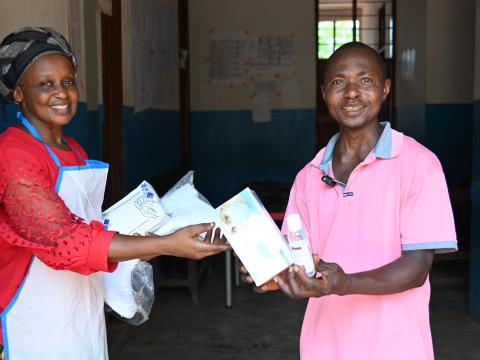DR Congo: Gemena Steps Up the Fight Against Mpox with Support from World Vision

Par Didier Nagifi, Communications Officer
In the heart of Sud-Ubangi province, the city of Gemena was once quietly threatened by the Mpox epidemic. Many residents, unaware of the disease’s early symptoms and how to respond, often sought care too late. At the Salongo 2 Health Center, head nurse Mimi frequently received patients in advanced stages of infection, complicating treatment and containment efforts.
Today, that reality is changing. With the support of World Vision, more than fifty community health workers have been trained to raise awareness and encourage anyone showing signs of illness to seek care early. According to nurse Mimi, this initiative has made a profound difference in disease control.
“Before, cases arrived at an advanced stage, complicating treatment. Today, thanks to community health workers, we receive patients at the first signs of illness. This not only allows for more effective treatment but also reduces the spread of the virus,” she explains.
The mobilisation extended far beyond training. Health workers have fanned out across the area, sharing vital prevention messages. As a result, residents now recognise early warning signs and understand how to protect themselves and others.
World Vision’s contribution also included essential protective equipment—hand sanitiser, gloves, gowns, boots, disinfectants, caps, thermometers, soap, and more. A tent, chairs, and tables were provided to improve patient intake and registration.
“This support has had a tremendous impact. Without this equipment, we would have had more severe cases and higher transmission rates. Today, thanks to early detection, we see a decline in cases,” says Mimi Gwana.
The importance of this support became even more evident after a nurse contracted Mpox due to a lack of personal protective gear.
“This showed us just how crucial this equipment is for our safety as healthcare providers,” Mimi adds.
Beyond material aid, World Vision has remained actively engaged. Regular follow-ups are carried out, and awareness campaign data is shared between the organisation and the health centre to track progress and reach.
“We know we are not alone in this fight. World Vision stands with us, continues to support us, and together, we are doing remarkable work for our community’s health,” concludes the nurse.
Thanks to this partnership, Gemena is now better equipped to respond to the Mpox epidemic. The city’s experience shows that when communities are informed, empowered, and supported, they can take charge of their health and resilience.